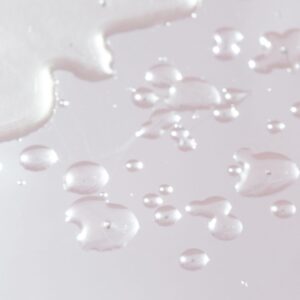
Stocksy
In This Article
What It Is Benefits Hair Type Considerations Side Effects How to Use The Final Takeaway
Squalane oil is popular among skincare enthusiasts because of its hydrating and moisturizing properties. It’s non-comedogenic and absorbs into skin quickly without leaving behind any oily residue. And though squalane is commonly found in moisturizers, eye creams, serums, cleansers, and makeup, it can also be found in yet another beauty category: Haircare.
Indeed, though less talked about for hair, squalane presents as a promising addition to your routine. "Squalane oil is a great ingredient for haircare because it replenishes moisture to your strands and protects the hair from further damage," says StyleSeat hairstylist Erinn Courtney. To get the full picture on squalane for hair, we asked Courtney as well as board-certified dermatologist Snehal Amin, MD, FACMS, FAAD, to share their thoughts.
Keep reading to learn more.
Meet the Experts
- Snehal Amin, MD, FACMS, FAAD, is a board-certified dermatologist and co-founder and surgical director of MDCS Dermatology: Medical Dermatology & Cosmetic Surgery, located in New York City.
- Erinn Courtney is a StyleSeat hairstylist and natural hair expert.
What Is Squalane?
Squalane is a moisturizing, skin-conditioning ingredient commonly found in skincare and haircare products. It’s derived from squalene, a natural sebum component (aka the oil your skin produces). Originally, squalane was harvested from shark liver. But now, squalane is typically sourced from plants, like olives and sugarcane, or synthetically made.
Squalane Oil for Hair
Type of ingredient: Hydrator, emollient
Main benefits: Adds moisture to the hair, prevents hair breakage, and helps prevent frizz
Who should use it: In general, anyone can use squalane oil for hair. Those with dry, damaged hair will often see the most benefits.
How often can you use it: Squalane oil is generally safe to use as needed, as often as daily application.
Works well with: Generally, squalane oil works well with all ingredients.
Don’t use with: There are no known ingredients that are unsafe to use with squalane oil.
Benefits of Squalane for Hair
- Moisturizes hair: Courtney notes that squalane oil is great for haircare because, as a hydrating ingredient, it replenishes moisture in hair strands.
- Increases shine: Thanks to the moisturizing properties noted above, squalane oil can create a natural shine that you often see in healthy hair. “For most hair, it will also add a silky, smooth texture,” adds Courtney.
- Prevents breakage: “Squalane prevents moisture loss and breakage of the hair,” says Amin.
- Tames frizz: As many of us know all too well, breakage can lead to frizz, often due to hot tools, weather, and other factors that contribute to dry, fragile strands. “Squalane prevents moisture loss and breakage, which means it will tame frizzy hair,” Amin says.
- No greasy finish: All too often, what seems to be the perfect hair oil ends up leaving a greasy residue on hair, leading to the opposite of a fresh, clean look. The experts both note that what makes squalane oil special is the lack of greasy trail it leaves behind (though a little does go a long way).
Hair Type Considerations
One of the many benefits of using squalane oil for hair is that it does not discriminate. “Squalane oil works great for all hair types,” shares Courtney. “You can apply more or less of the oil depending on your texture and density. If you are someone who applies a lot of direct heat on your hair or just notices that your hair is feeling extra dry, squalane oil will be a great way to replenish some moisture back into your hair follicles.
That being said, given its hydrating and moisturizing properties, dry hair will generally soak up the benefits (literally). "People with drier complexions or hair are more likely to notice the benefits of regular use," Amin shares. Because it is stable at high temperatures, it also protects the hair from heat. Think softer, shinier, and smoother hair."
Generally, if you are experiencing a dry, itchy scalp or dandruff, applying squalane oil directly to your scalp will help alleviate some of the dryness. “For this reason,” adds Amin, “it is also helpful for eczema, psoriasis, and dermatitis.”
It’s worth noting that people who have naturally straight or fine hair will want to be more frugal with their use of squalane oil. “This ingredient may weigh your hair down even more, so I would recommend avoiding the scalp and roots whenever applying it,” Courtney says.
Potential Side Effects
Like any new ingredient, it's essential to test the product on a small area of the scalp first to check for any potential allergies. Amin notes that signs of an allergic reaction include swelling, redness, and itching. If you experience any of these symptoms, discontinue use and consult a board-certified dermatologist.
How To Use Squalane Oil For Hair
Squalane oil is a generally easy product to use for the hair because it does not require any DIY formulating. “Squalane oil can be applied directly to your hair,” says Courtney. “You can apply a few drops of the oil directly onto your scalp and give yourself a nice scalp massage to work the product throughout the rest of your hair. It can also be applied directly to the mid-shaft and ends of your hair—whatever works best for you. I would also recommend using squalane oil in any hair treatments, deep conditioners, or steam treatments which will all help the ingredient to penetrate the hair follicles better and provide deeper hydration.” Amin concurs.
The experts agree that squalane oil is a great, typically safe-for-all option for helping keep locks luscious and hydrated while skipping any unwanted grease or residue. Whether it's applied directly to hair or added to your favorite products, this heavily beneficial emollient gets the seal of approval from both dermatologists and hair experts alike.
The Final Takeaway
Squalane oil is a lightweight, non-greasy oil that's derived from squalene—a natural compound found in our skin and certain plants. When used for hair care, squalane oil offers several benefits, including increasing hydration, boosting shine, reducing frizz, and preventing breakage. Squalane is safe for all hair types but is most beneficial for those with dry hair. The ingredient can be applied directly to your hair or can be added to your existing haircare routine via products containing squalane, such as conditioners, serums, and masks.
